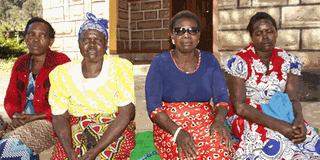Widows at higher risk of disinheritance during Covid-19

Members of Come-together Widows and Orphans Organisation in Igembe North, Meru County. Majority of the 3,000 members have land-related problems. World Bank says more widows likely to be disinherited during the Covid-19 period. PHOTO | DAVID MUCHUI | NATION MEDIA GROUP
Widows stand a higher risk of being disinherited especially during the Covid-19 pandemic as compounded barriers stand on their way to enjoying their housing, land and property rights.
World Bank’s senior land administration specialist Stanley notes that measures to contain the spread of the viral respiratory disease have added more risks to the list of numerous obstacles widows are already battling with to inherit their late husband's property.
Paul Prettitore, a senior land administration specialist with the World Bank’s Global Land and Geospatial Team conquers adding that legal barriers and patriarchal customs are barring women from owning property or taking ownership of a spouse's property.
The experts made reference to Kenya in their article published on World Bank's website of widows "being thrown out of their homes during social distancing, as they are seen as an extra burden and not really part of the family."
PREVIOUS CRISES
They say evidence from previous crises such as Aids, show women and orphans becoming subjects of disinheritance and Covid-19 is no different.
"During the Aids epidemic, widows and orphans often lost property to other family members and were left homeless, even as they dealt with their own health emergencies," they say.
A report by Federation of Women Lawyers-Kenya (Fida Kenya) on gender-based violence (GBV) cases filed between April 15 and May 5, indicate prevalence of widow eviction and physical violence by in-laws in Western Kenya.
The widow eviction cases totalled 10 out of the 289 GBV cases reported during the three-week period.
Moreover, they say, women in informal marriages are equally at risk of being disinherited since their legal rights to housing, land and property are pegged on formalisation of the union.
SPOUSES’ RIGHTS
In Kenya, a cohabitee has no right to lay claim to any property they may have jointly acquired should they separate.
The new marriage and matrimonial property laws exclude cohabitees from benefits available to spouses.
The Matrimonial Property Act, 2013 protects spouses' rights to monetary and non-monetary contributions during marriage. It clearly defines a spouse as a wife or husband, which is further emphasised in the Marriage Act (2014).
To prove a marriage one needs a certificate registered by the State under the Christian, Muslim, Hindu, Civil and Customary laws.
The experts say lack of financial resources further complicates women's efforts to reclaim their rights to property.
For instance, measures to contain Covid-19 like closure or slowdown of businesses and restricted movements has induced reduced incomes and wiped out savings for most women especially those in informal employment. Thus, unable to pursue justice as it requires financial input.
"Pandemics may reduce other economic assets such as wages and savings, making housing,land and property an even more important part of overall household assets," says Stanley.





